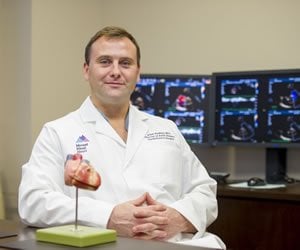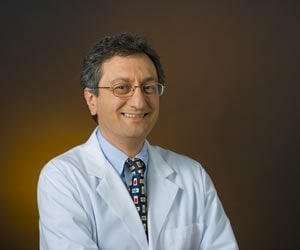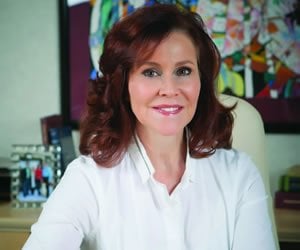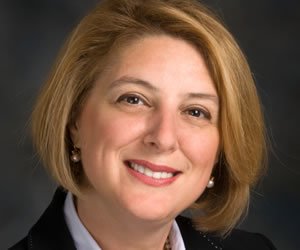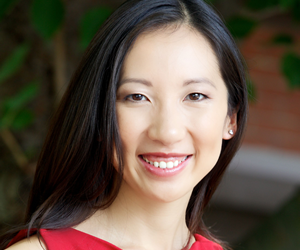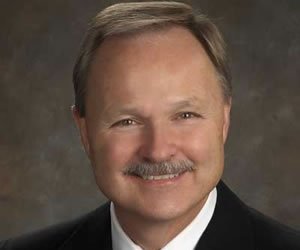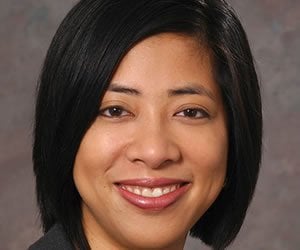The days are long, the nights short – unless you’re on call or night float, in which case that is reversed. Regardless of where you are in your training, whether in medical school or already out of residency, there will be days when it all just feels like too much. Too much work, too much emotional energy expended, too much illness. Too many petty tasks or meaningless phone calls or purposeless turf wars. Hopefully, those times will be few and far between, buoyed by the days where you make a tricky diagnosis, have an appreciative patient, or just get out of the hospital with daylight left and go for a run. However, for a significant number of physicians, these despondent days stack one atop the next, stretching into weeks where they feel to exhausted to invest energy in their patients, let alone themselves. These individuals are likely suffering from burnout.
physician
20 Questions: Allan S. Stewart, MD: Cardiothoracic Surgery
Thoracic surgeon Dr. Allan S. Stewart is director of the aortic surgery program and co-director of the valve repair center at Mount Sinai Health System. Stewart received his bachelor’s degree in biology magna cum laude from St. Peters College (1991), and his MD from University of Medicine & Dentistry of New Jersey (1995). Dr. Stewart completed an internship and residency in general surgery at Hospital of the University of Pennsylvania. He completed a postdoctoral research fellowship in the division of cardiothoracic surgery/department of physiology at University of Pennsylvania School of Medicine, a chief residency in general surgery at Hospital of the University of Pennsylvania, and a residency in cardiothoracic surgery at Columbia University Medical Center. Lastly, he completed a fellowship in ventricular assistance at Columbia University Medical Center. Dr. Stewart is currently associate professor of cardiothoracic surgery at Icahn School of Medicine, Mount Sinai Health System.
20 Questions: Antoine Sayegh, MD: Medical Oncology/Hematology
Dr. Antoine Sayegh is a hematologist and medical oncologist practicing in Sacramento and Roseville, California. … Read more
20 Questions: Mary Lupo, MD, Dermatologist
Mary Lupo, MD, is a practicing dermatologist and clinical professor of dermatology at Tulane University School of Medicine. Dr. Lupo began using combination protocols for her patients that included collagen fillers, light chemical peels, and topical products such as Retin-A and alpha hydroxy acids with sun protection. She received a bachelor’s degree in biology from Newcomb College of Tulane University (summa cum laude, 1976). She received her MD from Tulane University School of Medicine (1980). She then completed an internal medicine internship at Ochsner Hospital (1980-1981) before entering the dermatology program at Tulane University School of Medicine (1981-1984), where she served as chief resident in her final year.
Dr. Lupo is a member of the American Academy of Dermatology (former committee member); American Dermatological Association; American Society for Dermatologic Surgery (former board of directors and committee member); Women’s Dermatologic Society (former president and committee member); Eastern College of Health Vocations (medical advisory board); TopMD Skin Care (medical advisory board); Strathspey Crown (founding member and operating partner); Annenberg Circle of the Dermatology Foundation; and Stegman Circle of the ASDS Dermasurgery Advancement Fund. Dr. Lupo is the author of more than 60 published articles and book chapters, and she has been a speaker on various dermatological topics at nearly 250 national and international meetings and seminars. She serves on the editorial board of Prevention Magazine, Current International, the Journal of European Academy of Dermatology and Venereology, and Cosmetic Dermatology. Dr. Lupo has been published in Journal of Drugs in Dermatology, Journal of Clinical Aesthetic Dermatology, Cosmetic Dermatology, Journal of Cosmetic Dermatology, The Skin Cancer Foundation Journal, Dermatological Surgery, Plastic Reconstructive Surgery, Dialogues in Dermatology, Journal of Dermatological Surgery Oncology, Postgraduate Medicine, and Archives of Dermatology.
Those Who Can Do, Teach….and Lead: A Conversation with Mark Walton, MD
At this past year’s UC Davis Pre-Health Conference, Stanford Health Care’s Chief of Staff, Dr. Mark Welton headlined three popular sessions. His talks centered on what a chief of staff is, how you get to be chief of staff, and what we need to do to maintain health care costs.
No one would have guessed that back in the 1970’s, on this same campus, the distinguished physician and leader was told he’d never make it through UC Davis’s pre-med program, let alone get into medical school.
“I struggled through some of the classes,” Walton, who is also the Chief of Colon and Rectal Surgery, admits. Lucky for the medical profession, he not only managed to make it through pre-med, but successfully finished medical school at UCLA and completed a fellowship in colon and rectal surgery at Washington University. After teaching at University of California, San Francisco for 8 years, Walton transitioned to Stanford in 2001 and has been there ever since.
Breaking Bad (News, That Is)
My stomach sunk. The results of the biopsy were back and it was not good. I had met Ms. Jones eight days ago when she was admitted for a pneumonia that antibiotics couldn’t seem to shake. Once hospitalized, we’d brought out the big guns and she had been clinically improving on that well-loved duo of vanc and zosyn. (Med students take note: vanc/zosyn is almost always an acceptable answer when pimped about which antibiotics to start – they may be overkill, but you’re unlikely to be wrong.) Despite her improvement, things had not been adding up – we kept putting 2 and 2 together and getting 6. A young woman in her late 30s, she had no good reason to have this month-long pneumonia and her chest x-ray looked, in a word, terrible. Even I as an intern could see that what had been a right middle lobe infection when she first presented a month ago was now also in her upper lobes and – oddly – her left lung was looking increasingly cloudy.
Take It From Me…
About to head out on some interviews? First spend some time with these physicians as … Read more
Barbara Ross Lee: The Beauty of the Broken-Field Run
There’s no doubt that Dr. Barbara Ross Lee has led a distinguished career. The first African-American woman to be appointed Dean of a medical school, her other accomplishments include participation in the Robert Wood Johnson Health Policy Fellowship and garnering numerous awards. But for Ross, the path to success was full of twists and turns.
“At my institution, we call it the ‘broken field run’,” she told Student Doctor Network during an interview at the 2014 UC Davis Pre-Health conference. “It wasn’t as if I (had the typical path and) went to school and did pre-med and then went to medical school and then went into post-graduate training. I went to undergrad, then I got a job, then I got married, had kids, then I went back and got a masters, and then the opportunity arose for me to go to medical school.” And that’s just the beginning of her storied career.
Mission Medicine
Lucy Doyle, M.D., had never imagined that life after residency could be so hard. But … Read more
Talking to Parents About Vaccines
Well Baby visits can be stressful for both physicians and the new parents – not … Read more
When Did You Know You Wanted to be a Doctor?
When did you know you wanted to be a doctor? the pre-med asked. Maybe it should … Read more
20 Questions: Barbara Pro, Oncologist
Dr. Barbara Pro, a medical oncologist in Philadelphia, is a Thomas Jefferson University-Kimmel Cancer Center … Read more
Hospitalists "Seeing Wisely": A High Value Proposition
I remember being a third year medical student and reading Bob Wachter’s piece in the New … Read more
When Doctors Listen: A Conversation with Dr. Leana Wen
Dr. Leana Wen was on a roll. The Washington University medical student was president of … Read more
Finding the Joy in Medicine: A Conversation with Dr. David A. Fleming
Despite being the current President of the American College of Physicians (ACP), David A. Fleming, … Read more
Leveraging Pre-Med Learning Experiences for Success
Pre-medical students can – and should – take advantage of the many opportunities available to … Read more
20 Questions: Kornelia Polyak, MD, PhD, Medical Oncologist
Kornelia Polyak, MD, PhD, is a professor of medicine in the department of medical oncology at the Dana-Farber Cancer Institute at Harvard Medical School, as well as a biomedical researcher focused on translational studies with potential clinical impact regarding human breast cancer. Dr. Polyak has been a member of the Harvard Biological and Biomedical Sciences (BBS) graduate program since 1999, and as a BBS faculty member, she has participated in teaching several graduate courses and giving talks at departmental retreats and minisymposia. She has also participated in new student recruiting events by interviewing prospective students, attending dinners/receptions, and welcoming new students. Dr. Polyak received her MD summa cum laude from Albert Szent-Gyorgyi Medical University in Szeged, Hungary (1991), and her PhD in cell biology and genetics from Weill Cornell Graduate School of Medical Sciences (1995). She was a research associate in cancer genetics at Johns Hopkins Oncology Center, Howard Hughes Medical Institute (1995-1998).
Avoiding Business Mistakes as a New Doctor
Avoid common business mistakes to make a smooth transition to private practice.
The Fatal Failings of Evidence Based Medicine
The medical system (and much of the culture) these days is focused on group outcomes, not individuals. Personally, I think that stinks.
In medicine, this failing comes from improper use of what was originally a good idea—evidenced based medicine (EBM). EBM was developed to help overcome anecdotal medicine, in which a seemingly successful therapy in one patient gets adopted by a physician as the “way to go” and then preached to his trainees as the management of choice, and over time becomes unexamined gospel. “Anecdote-based medicine” is a form of groupthink, and groupthink is bad in general and particularly bad for the patient sitting in front of us on an exam table.
There needed to be some way to help doctors realize that an individual patient response is not generalizable to others.
EBM evaluates groups of patients to determine statistical responses to interventions. It was created (initially) to help doctors determine whether an intervention is likely to work in an individual patient. In that way, it was originally kind of the obverse of anecdotal medicine.
20 Questions: Jennifer H. Yang, MD, Urology
Jennifer H. Yang shares her thoughts on the field of urology and offers some advice for students.


